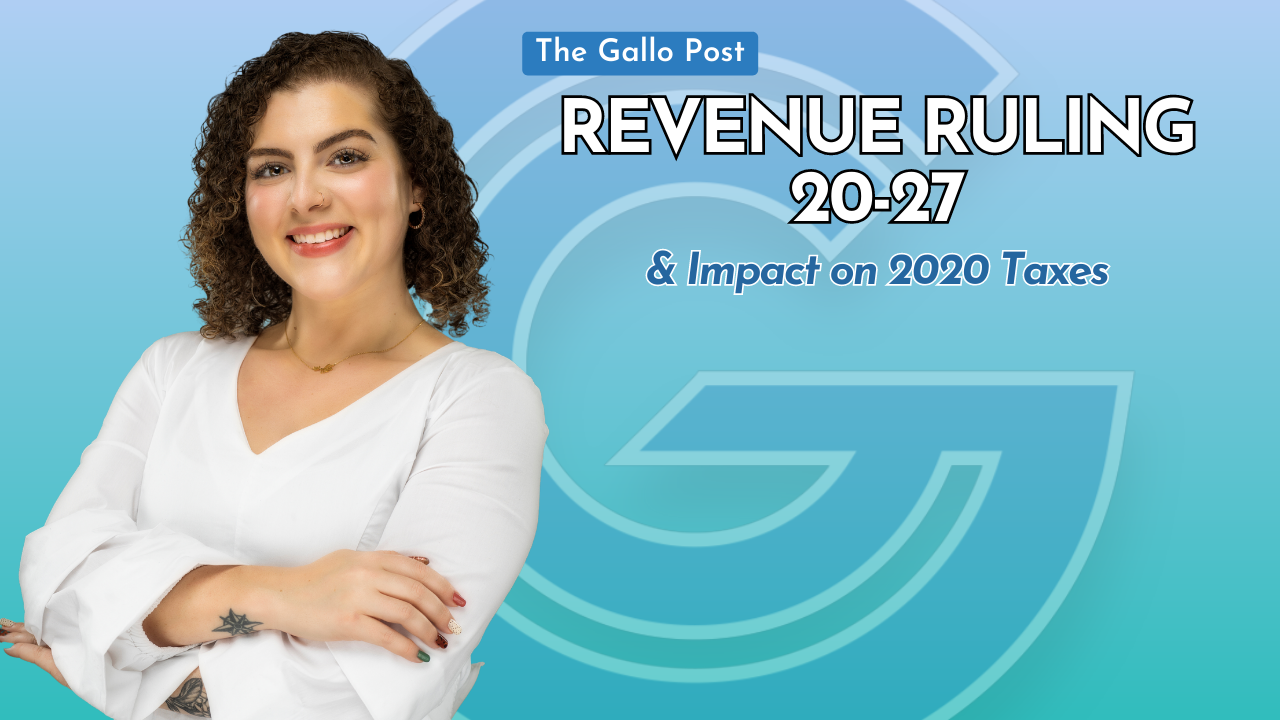Rev. Ruling 20-27
Dec 04, 2020
If you are confused by the announcement of Revenue Ruling 2020-27 on November 18th, welp, join the club. What was initially considered much-needed relief to small businesses during the beginning of COVID-19 restrictions around the country in March is now leaving these same business owners debating if the forgiveness of their Paycheck Protection loan will even be worth it.
How did we get here?
When Congress first announced the implementation of the CARES Act and accompanying Paycheck Protection Program loans, small business owners around the country rejoiced. Lenders received thousands of applications, and up to $659 billion was authorized to be used for this program. A key question that was not clear at the time owners were accepting these loans was, “How is this going to affect my 2020 taxes?”. With the threat of their livelihoods on the line and reassurance from Congress that these loans would be forgiven if properly used, nearly 4.9 million businesses decided to take the gamble.
In May, the IRS released notice 2020-32 that indicated “no deduction is allowed for an eligible expense that is otherwise deductible if the payment of the eligible expense results in forgiveness of the covered loan. Meaning payroll, rent, covered mortgage interest, and covered utility payments are no longer deductible for business owners in 2020. If deductibility of the expenses depends on forgiveness, how does a borrower know if their expenses will be deductible or not? This created confusion amongst borrowers as most would not have applied for forgiveness prior to the end of the year.
Remember, Accountants are your allies when it comes to figuring out what deductions apply to your particular circumstance. Here at The Gallo Group, we have been doing it for a while! We’re ready to answer those tricky questions for you. Contact us here, or give us a call at (954) 547-1172.
What is Revenue Ruling 2020-27?
After months of wondering, the IRS released Revenue Ruling 2020-27 (Rev. Rul.) and Revenue Procedure 2020-51 (Rev. Proc.) to clarify this stance. Put simply, a Rev. Rul. is an official interpretation by the IRS, and a Rev. Proc. states instructions on how the IRS will implement this interpretation. To the public’s dismay, not much changed in the IRS’ tune regarding the deductibility of PPP-related expenses. They clarified their stance on the timeliness of forgiveness and how it relates to 2020 expenses, stating that if a borrower has a “reasonable expectation of reimbursement,” deduction is not allowable.
So, business owners will be in one of two boats: They are under the reasonable belief that they will receive forgiveness for the loan and do not deduct covered payroll, rent/mortgage, and utility expenses. Or they do not apply for forgiveness of the loan (or are denied), and they accept the liability of the loan. However, in this instance, they will be allowed to deduct all covered expenses. If a business initially thinks it will receive forgiveness, they do not deduct the covered expenses and are denied forgiveness; it can amend its tax return to make the now allowable deductions.
Considerations moving forward
Instead of answering questions, it seems like the IRS has just created a sea of them. With distinctions for self-employed individuals still unclear and Congress working to pass amendments to the CARES Act that could throw entirely new wrenches into the mix, we still do not have a clear picture of how your taxes could be affected by accepting the PPP funds. Unfortunately, at this time, the ruling from 2020-27 is the one that currently stands, and you should plan at the moment considering.
With that being said, waste no time getting with your accountant to discuss how this will affect your tax liability for 2020. With the IRS ruling, it may be worth considering if the tax liability incurred from the PPP funds is more or less cost-effective than simply paying back the loan (1% interest rate, payable over 2 years).
Here’s to hoping the end of this year not only brings an end to this pandemic but also clarity on how to move forward with getting these loans off of your books. Not allowing businesses to deduct these expenses will lead to higher net incomes and could cause potential financial burdens, which the AICPA (American Institute of Certified Public Accountants) believes is contrary to Congress’ initial intent with the CARES Act, which was to alleviate the pressure on our small businesses during this trying time.

